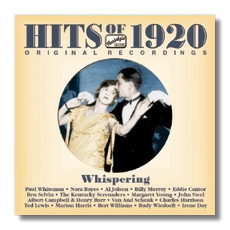
The Internet's Premier Classical Music Source
Related Links
- Latest Reviews
- More Reviews
-
By Composer
-
Collections
DVD & Blu-ray
Books
Concert Reviews
Articles/Interviews
Software
Audio
Search Amazon
Recommended Links
Site News
 CD Review
CD Review
Hits of 1920

Whispering
- 20 original recordings by Paul Whiteman, Al Jolson, Billy Murray, Eddie Cantor, Marion Harris, and others
Naxos Nostalgia 8.120635 ADD monaural 61:24
Of course this isn't a classical recording, strictly speaking, but there's much here to interest classical collectors. By nature, those who admire classical music are not afflicted with the "out with the old, in with the new" malaise, and they are likely to have an appreciation for good music of all types from the days gone by. One disparages popular music for being ephemeral, yet here are twenty popular songs that give pleasure more than eighty years down the road! (All of them were recorded in either 1919 or 1920.)
Another point of interest for classical collectors is the inclusion of "Swanee," a very early hit for George Gershwin. Here, it is sung by Al Jolson, with whom it has been associated ever since. This Columbia shellac from 1920 finds Jolson less exaggeratedly histrionic than he would be in later decades, which is to the benefit of the song. A second Jolson hit, the song "Avalon" (co-written by Jolson and Vincent Rose) still has the power to connect with the listener – at least this one – on a strongly emotional level.
Yet another point of interest is Frédéric François Chopin. What's he doing here, you ask? Well, oddly enough, he (or more specifically, the Funeral March movement from his Second Piano Sonata) makes a guest appearance in two songs about the Prohibition, which began in the United States on January 16, 1920. Irving Berlin's "I'll See You in C-U-B-A" (sung here by Billy Murray, a comic singer in the style of Eddie Cantor) quotes the march's opening phrase to suggest the possible effects of consuming a little too much hooch during a drinking vacation in Cuba. "The Moon Shines on the Moonshine" is an even more broadly humorous ditty written by Robert Hood Bowers and Francis De Witt, and sung here by Bert Williams. Here, the cantabile section of the same movement is used to suggest the pathos of a commercial distillery in cobwebs, no longer in production of intoxicating spirits! I wonder if Chopin would have been amused?
The title track, performed by "Paul Whiteman & His Ambassador Orchestra" includes a solo for what seems to be a musical saw. I'm impressed. Later, composer/saxophonist Rudy Wiedoeft's "Saxophobia" solidly challenges much later frenetic sax instrumentals such as "Yakety Sax." For more operatic tastes, there's contralto Nora Bayes singing about "The Japanese Sandman," and Irish tenor (in style, if not in patrimony) Charles Harrison in raptures over his "Pretty Kitty Kelly." For novelty-seekers, there's Eddie Cantor's mildly suggestive "You'd Be Surprised" - again, written by Irving Berlin. (Berlin also wrote "After You Get What You Want, You Don't Want It," performed here by Van & Schenck.) On the distaff side, Margaret Young (aunt to Margaret Whiting) strikes sparks with the energetic "Oh! By Jingo!" And, to slow things down and give a foretaste of an authentic jazz singing style, Marion Harris's "St. Louis Blues" is another treasurable recording.
These sides were made via the acoustic process – without microphones or recording tape. Performers projected into a horn, and the vibrations were directly converted into the wiggles of a groove on the master disc. David Lennick's transfers are remarkably good, and digital noise reduction by Graham Newton removes the worst of the sonic distractions without removing the music or the performers.
Naxos' booklet note includes an entertaining summary of what went on in 1920. Did you know that even back then, Olympic athletes were accused of using performance enhancing drugs? The annotations contain recording dates and locations, and matrix numbers for each of the discs – an unexpected bonus for a CD of this type.
Very enjoyable, and highly recommended.
Copyright © 2002, Raymond Tuttle


















